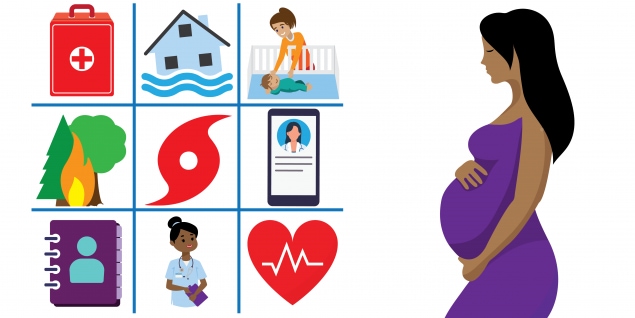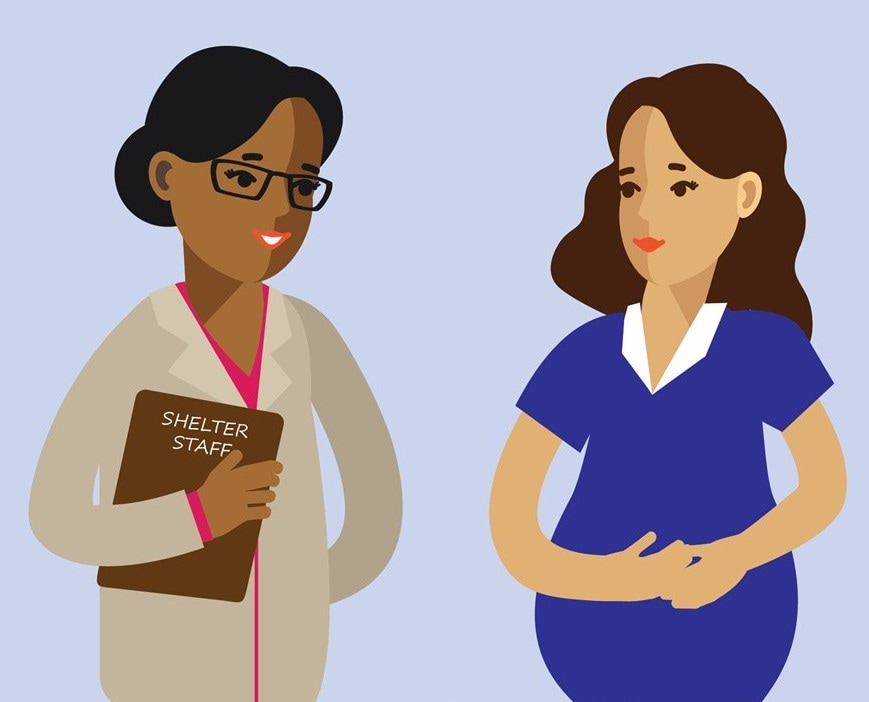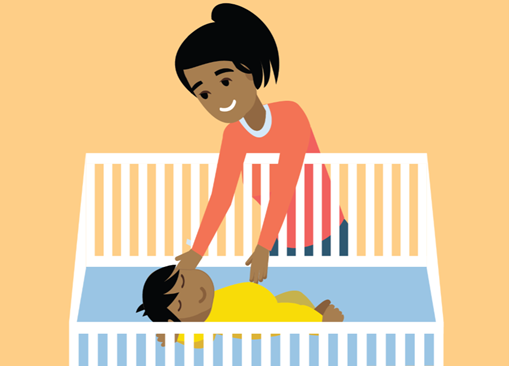Natural Disaster Safety for Expecting and New Parents

Natural disasters, such as wildfires, hurricanes and floods, can be unpredictable and devastating. Learn some tips to get prepared and keep yourself and your family safe before, during and after a disaster.
Get Prepared for an Emergency or Disaster
Disasters can be scary and stressful, especially if you’re expecting or have a baby. You can take the following steps now to help prepare for an emergency and better cope if an emergency happens.
- Talk to your healthcare provider about where you will get prenatal care or deliver your baby if your provider’s office or hospital is closed.
- If you are close to your due date, learn the signs of labor including information on preterm birth. Talk to your healthcare provider about what to do in case of an emergency.
- Be informed—check with your local emergency management agency to find out how to get emergency alerts (such as text alerts).
- Make a family emergency action plan for how you and your family will contact one another and what steps you will take in different types of situations.
- Prepare an emergency kit that includes at least a 3-day supply of food and water for each person, health supplies including medications, baby care and safety supplies, and backup chargers for electronics like a cellphone or tablet. Try to store a 2-week supply of water if possible.
- Keep copy of important family documents like insurance policies, ID card, copy of all prescription information and medical supplies in a waterproof, portable container.
- Plan ahead to help your baby sleep safely if you need to leave your home. Your baby is safest sleeping on their back in their own sleep area (such as a portable crib or bassinet) that does not have pillows, blankets, or toys.
What to Do During and Just After Disaster
If You Are Pregnant

If you need to leave your home, find out where to shelter. Tell the shelter staff as soon as possible that you are pregnant and if you have any health problems.
There are special medical needs during pregnancy. If you’re pregnant or think you may be pregnant, you can take the following steps to help you in the event of a disaster.
- If you have any signs of labor, call your healthcare provider or 911, or go to the hospital immediately if it is safe to travel.
- If you need to leave your home, find out where to shelter. Be prepared to leave quickly and have your emergency kit that includes copies of medical records, health care providers’ information, and prenatal vitamins or medicines, ready to go. Tell the shelter staff as soon as possible that you are pregnant and if you have any health problems.
- Continue taking your prenatal vitamins or prescription medicines as directed.
- Protect yourself from infections by washing your hands often and staying away from moldy or dirty places and people who are sick. If you do get sick, talk with a healthcare provider right away.
- During extreme heat, wear loose, lightweight, light-colored clothing, stay hydrated, and try to keep cool to prevent your body from overheating. Stay in air-conditioned buildings as much as you can. If your home is not air-conditioned, spend time in public facilities that are air-conditioned and use air conditioning in vehicles. Contact your local health department or find an air-conditioned shelter or cooling center in your area.
- Once you are out of immediate danger, continue your prenatal care, even if it is not with your regular healthcare provider. Tell the healthcare provider if you have any health problems and if you need help getting your prenatal vitamins or medications.
- Take care of your emotional health and practice healthy stress management. Engaging in physical activity, getting enough rest and drinking enough water can help you reduce stress. Ask for help if you are feeling overwhelmed or stressed.
If You are a New Parent or Caregiver of an Infant

Plan ahead to help your baby sleep safely. Your baby is safest sleeping on their back. Place the baby in their own sleep area (e.g., a portable crib or bassinet) that does not have pillows, blankets, or toys.
A disaster can make it difficult to access necessary supplies and health care. Parents and caregivers of infants can take the following steps to help keep their families safe and healthy in the event of a disaster.
- If you have to leave your home, have your emergency kit that includes copies of medical records and emergency telephone numbers, health care providers’ information, medicines and infant care supplies, such as baby food and a portable crib, ready to go. Have at least a 3-day supply of water and food for each person. Try to store a 2-week supply of water if possible.
- Be prepared to leave quickly.
- Tell the shelter staff about any care needs you or your baby may have and take actions to help your baby sleep safely.
- If you or your baby use prescription medicines and you have them with you, take them with you and continue taking or giving them as directed.
- If you breastfeed your baby, continue to do so. If you feed your baby formula, use ready-to-feed formula if possible. Clean water may not be available for mixing formula or washing bottles. Learn more about infant feeding during disasters.
- During disasters, harmful chemicals from businesses and other places may be released into the environment. Listen to announcements from emergency officials about chemical safety and actions you may need to take to protect yourself. If you have questions about exposure to harmful chemicals during pregnancy and breastfeeding, call MotherToBaby at 1-866-626-6847. To reach the nationwide poison control center, call 1-800-222-1222.
- As soon as it is safe to do so, see a healthcare provider for well-baby checkups or if you’re concerned about a health problem, even if it is not with your baby’s usual healthcare provider. Tell them if you need help getting your baby’s prescription medications.
If You Recently Gave Birth
If you gave birth within the past year you may face unique challenges during disasters. In addition to the tips for parents above, follow these tips to protect yourself in case of an emergency.
If you have given birth within the last two months:
- If you need to leave your home, prepare a kit with essential items. If you use feminine hygiene products, such as menstrual pads or tampons, consider bringing a supply, as they might not be immediately available when you need them.
- As soon as it is safe to do so, get a postpartum checkup if you are due for a visit, even if it is not with your usual healthcare provider. Tell them if you need help getting your prescription medications. If you’re not ready to get pregnant, you can ask for several months’ supply of the pill, patch, or ring or consider using a birth control method that will prevent pregnancy for an extended period of time.
If you have given birth within the past year:
- If you think that you may be depressed, make an appointment to talk to your health care provider as soon as possible. Learn more about depression during and after pregnancy.
- Learn the urgent maternal warning signs and symptoms. Seek medical care immediately if you experience any of these signs or symptoms.
- Natural Disasters and Severe Weather
- Natural Disasters, Severe Weather, and COVID-19
- Natural Disasters and COVID-19: Preparedness Information for Specific Groups
- Preparedness and Safety Messaging for Hurricanes, Flooding, and Similar Disasters
- Reproductive Health in Emergency Preparedness and Response
- Safety Messages for Pregnant, Postpartum, and Breastfeeding Women During Disasters
- Wildfire Smoke and Pregnancy
- Disaster Planning: Infant and Child Feeding
- Caring for Children in a Disaster
- How to Manage Your Chronic Disease During a Disaster
- Coping with a Disaster or Traumatic Event
- Radiation Emergencies: Infant Feeding and Pregnancy
- To locate family: FEMA’s National Emergency Family Registry and Locator System